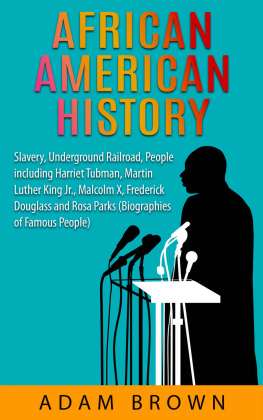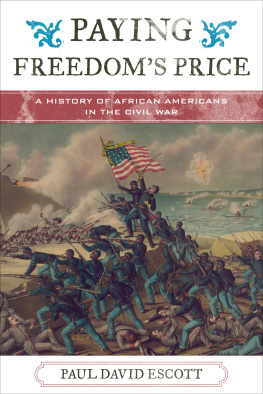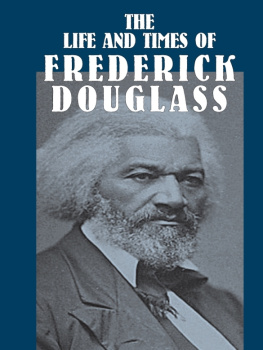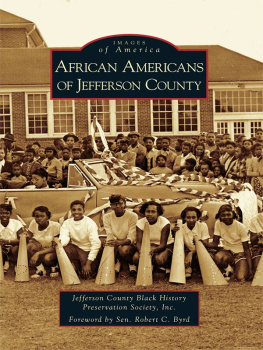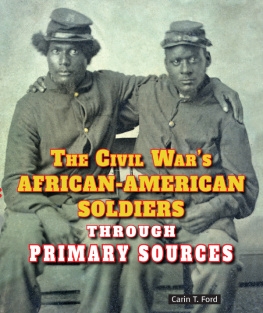Freedoms Journey
African American Voices of the Civil War
EDITED BY
DONALD YACOVONE

Library of Congress Cataloging-in-Publication Data
Freedoms journey : African American voices of the Civil War / edited by Donald Yacovone.1st ed.
p. cm.
Includes bibliographical references (p. 553) and index.
ISBN 1-55652-511-7 (cloth)ISBN 1-55652-521-4 (pbk.)
1. United StatesHistoryCivil War, 1861-1865African Americans.
2. United StatesHistoryCivil War, 1861-1865Personal narratives.
3. African AmericansBiography. 4. SlavesUnited StatesBiography.
5. African American soldiersBiography. 6. African American political activistsBiography. I. Yacovone, Donald.
E540.N3F73 2004
973.7092396073dc22
2003018583
Cover art: Jacob Lawrence (19172000); The Life of Harriet Tubman, no. 27, 1940; casein tempera on hardboard, 12 17 7/8;
Hampton University Museum, Hampton, VA. Reproduced with the permission of The Jacob and Gwendolyn Lawrence Foundation. Jacket design by: Joan Sommers Design Interior design by: Peirce Graphic Services
2004 by Donald Yacovone
All rights reserved
First edition
Published by Lawrence Hill Books
an imprint of Chicago Review Press, Incorporated
814 North Franklin Street
Chicago, Illinois 60610
1-55652-511-7 (cloth)
1-55652-521-4 (paper)
Printed in the United States of America
5 4 3 2 1
For
My Friends
Contents
Abbreviations
AME Church
African Methodist Episcopal Church
AMEZ Church
African Methodist Episcopal Zion Church
Berlin et al., Freedom: The Destruction of Slavery
Ira Berlin et al., eds. Freedom: A Documentary History of Emancipation, 18611867: The Destruction of Slavery. Series 1, volume 1. Cambridge, England: Cambridge University Press, 1986.
Berlin et al., Freedom: The Wartime Genesis of Free Labor: The Upper South
Ira Berlin et al., eds. Freedom: A Documentary History of Emancipation, 18611867: The Wartime Genesis of Free Labor: The Upper South. Series 1, volume 2. Cambridge, England: Cambridge University Press, 1994.
Berlin et al., Freedom: The Black Military Experience
Ira Berlin et al., eds. Freedom: A Documentary History of Emancipation, 18611867: The Black Military Experience. Series 2. Cambridge, England: Cambridge University Press, 1982.
Emilio, A Brave Black Regiment
Luis F. Emilio. A Brave Black Regiment: History of the Fifty-fourth Regiment of Massachusetts Volunteer Infantry, 18631865. 2nd edition, Boston, 1894. Reprint, New York: Johnson Reprint, 1968.
Faust, Historical Times Illustrated Encyclopedia of the Civil War
Patricia Faust, ed. Historical Times Illustrated Encyclopedia of the Civil War. New York: HarperCollins, 1986.
McPherson, Battle Cry of Freedom
James M. McPherson, Battle Cry of Freedom: The Civil War Era. New York: Oxford University Press, 1988.
Official Records
The War of the Rebellion: A Compilation of the Official Records of the Union and Confederate Armies. 128 vols. Washington, DC: Adjutant Generals Office, 18801901.
RG
Record Group, National Archives
Ripley et al., The Black Abolitionist Papers
C. Peter Ripley et al., eds. The Black Abolitionist Papers. 5 vols. Chapel Hill, NC: University of North Carolina Press, 19851992.
Sifakis, Who Was Who in the Civil War
Stewart Sifakis, ed. Who Was Who in the Civil War. New York: Facts on File, 1988.
Trudeau, Like Men of War
Noah Andre Trudeau. Like Men of War: Black Troops in the Civil War, 18621865. Boston: Little, Brown and Co., 1998.
USCC
United States Colored Cavalry
USCHA
United States Colored Heavy Artillery
USCT
United States Colored Troops
Warner, Generals in Blue
Ezra J. Warner. Generals in Blue: Lives of the Union Commanders. Baton Rouge, LA: Louisiana State University Press, 1964.
Wilson, The Black Phalanx
Joseph T. Wilson. The Black Phalanx: African American Soldiers in the War of Independence, the War of 1812 & the Civil War. Hartford, CT, 1880. Reprint: New York: DaCapo Press, 1994.
Yacovone, A Voice of Thunder
Donald Yacovone, ed. A Voice of Thunder: A Black Soldiers Civil War. Urbana, IL: University of Illinois Press, 1998.
Foreword
The Negro is the key of the situationthe pivot upon which the whole rebellion turns. These words of Frederick Douglass that begin Freedoms Journey, Donald Yacovones excellent collection of Civil War and post-Civil War documents, are at the heart of the material you are about to read. Unlike other texts that describe the road to war, its consequences, and the aftermath through the work of abolitionists, politicians, soldiers, slaveholders, slaves, and freedmen and freed-women from various regions of the country, this collection is wholly devoted to the attitudes and voices of black people. For black people were indeed the pivot, as it were, at the center of these extraordinary events. As such this book represents not only a unique opportunity to explore the feelings of the people for whom the war was fought, but it also resurrects their involvement in the war and allows us a clearer picture of the democratic ideals that precipitated it.
These ideals have, I am sorry to say, been lost in many instances, through the historical re-coloring of the events to reflect not the fight against the horror of slavery, but some idealized nonsense about Southern chivalry and the Lost Cause. Too often we are eased into forgetting that the Southern states of the Confederacy were in rebellion against the lawful authority of the United States, that they hoped through secession to retain the institution of slavery, and hold in bondage 4 million African Americans against their will. At the root of all the myriad histories of the period of the Civil War and its aftermath is this unassailable fact.
Yet, as Donald Yacovone tells us in his introduction, blacks and whites, Northerners and Southerners held and still hold entirely different views of the War, its meaning, and its residual effects. How is this possible?
The major reasons are the extraordinary volume of history written about the Civil War and its aftermath, the color of its content, and who wrote it. There is another, less obvious factor, however. An example is Edward Kings book, The Great South. Originally published as a series of articles by Scribners Monthly during 1873 and 1874, and described by its editors as presenting a remarkably sensitive and vivid picture of the American South in an important period of its history, as well as a work that encouraged sectional reconciliation [italics mine], one is struck by the contrasting images of whites and Negroes. King, a northeastern reporter for the New York Times, begins his first chapter with the words, Louisiana to-day is Paradise Lost. Throughout his description of New Orleans and the South of his today, he gently juxtaposes energetic whites with lazy blacks, and contrasts a faded South eager to retake its place in America against the more odious carpet-baggers, who have arrayed the negro wrongfully against the principal property-holders (p. 793). While not a history of the South or the war, it was the first widely read description of the post-war South, and largely contributed, I believe, to the germ of the idea of a Lost Cause and a




